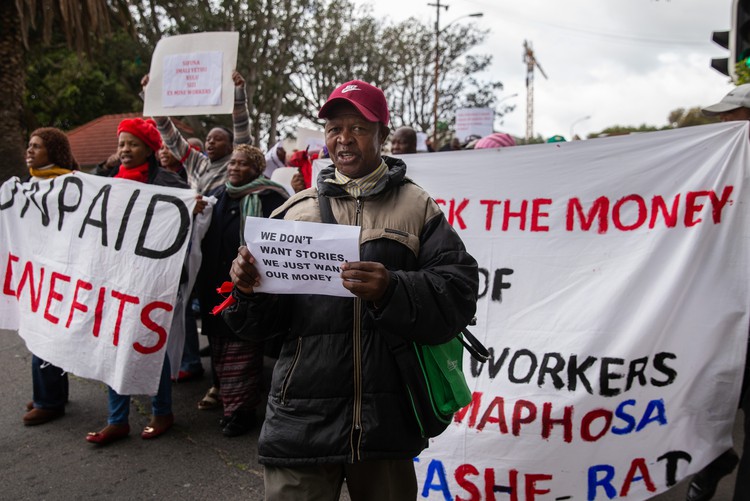Workers commemorate Marikana in Cape Town and Johannesburg
Ex-miners say they are owed benefits
Demonstrations in Cape Town and Johannesburg commemorated the Marikana massacre on Thursday.
In Cape Town about 50 ex-miners and their supporters marched to demand unpaid benefits and access to their provident and pension funds. They also commemorated the 2012 killing by police of 34 miners in Marikana near Rustenberg in North West Province. 47 people, including two police officers and two security personnel, are estimated to have died in August 2016 during the strike at the Lonmin platinum mine.
The march, made up mostly of elderly men and women, started in Keizersgracht Street and ended at Parliament. It was organised by the Unpaid Benefits Campaign and Right2Know (R2K).
R2K’s Khaya Xintolo said, “We are hoping that the Minister of Mineral Resources will provide answers as to when the ex-mineworkers will get what is due to them. We feel that this money would make a big difference in their lives and that of their families. We have been working with the ex-mineworkers for over two years now, even compiling a database with all the names of those that are still awaiting their funds. So far we have over a 1,000 names on that list in the Western Cape alone.”
Former miner, 69-year-old Sithonga Tiso, who currently lives in Philippi, said they have been up and down these past couple of years, trying to get information about what is happening with their money.
“There is money, but it is not being given to us which is why we are going to Parliament. I do not know how much I am owed, but I know there is money I am supposed to get from my provident fund. I worked as a miner for 12 years, from 1976. I worked for a coal mine in Dannhauser near Newcastle, then I moved to Hlobane Mine in Vryheid. I lost my job … If I could get my money I would fix my home and I would be able to further educate my children,” said Tiso.
Another former miner, Bathini Lubaxa, 58, who lives in Makhaza in Khayelitsha, started working as a miner in 1973 at a gold mine in the Free State. After a few years he moved to Winkelhaak Mine in Mpumalanga.
“I worked as a miner from 1973 to 1984. I was fired after we as miners went on strike in solidarity with others who were in support of Nelson Mandela being released from prison. I am waiting for my provident and pension fund. And I would use that money to start some sort of business and take my kids to further their studies,” said Lubaxa.
Marchers, escorted by traffic and police officers, sang struggle songs and waved placards with the words, “We don’t want stories, we just want our money”, “unpaid benefits”, and “pay back our money”. At Parliament they wished to hand over their memorandum to Gwede Mantashe the Minister of Mineral Resources.
The memorandum, which was ultimately accepted and signed by Sheila Maweni from the Department of Mineral Resources (DMR), demanded, among other things, that the DMR play a leading role facilitating payment of benefits to ex-mineworkers. The marchers have given the department 30 days to provide answers to their demands.
In Johannesburg about 50 people from civil society organisations lit candles on Nelson Mandela bridge to commemorate the Marikana miners.
Pictures of the miners were strung across the bridge and struggle songs were sung.
Marikana Support Committee, Right2Know, Socio-Economic Rights Institute, Voices of the Poor Concerned Residents, Soweto Women’s Forum, United Front and Amandla mobi participated in the vigil.
“We are here today not to cry, but to celebrate their lives and their legacy in fighting for their human dignity,” said Sikungo Jebe from Right2Know. He said the the organisations wanted to send a message to the government that it should “deal harshly with multinational corporations”.
“Multinational corporations, like Lonmin, have a responsibility to develop the communities where they operate but the government also has a responsibility to ensure that they are doing this … If not, people take to the streets and it turns into a war, like what happened at Marikana”, said Jebe.
He said multinational corporations and government should always include the communities in their decisions so that their voices are heard and it does not escalate to “another Marikana”.
Next: Shack dwellers too scared to shit
Previous: Gogos get tent for shelter
© 2018 GroundUp.
This article is licensed under a Creative Commons Attribution-NoDerivatives 4.0 International License.
You may republish this article, so long as you credit the authors and GroundUp, and do not change the text. Please include a link back to the original article.



